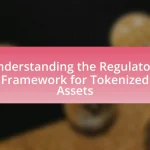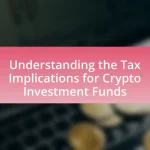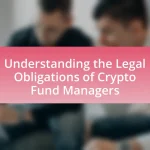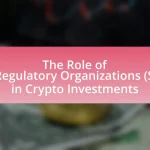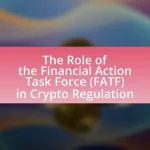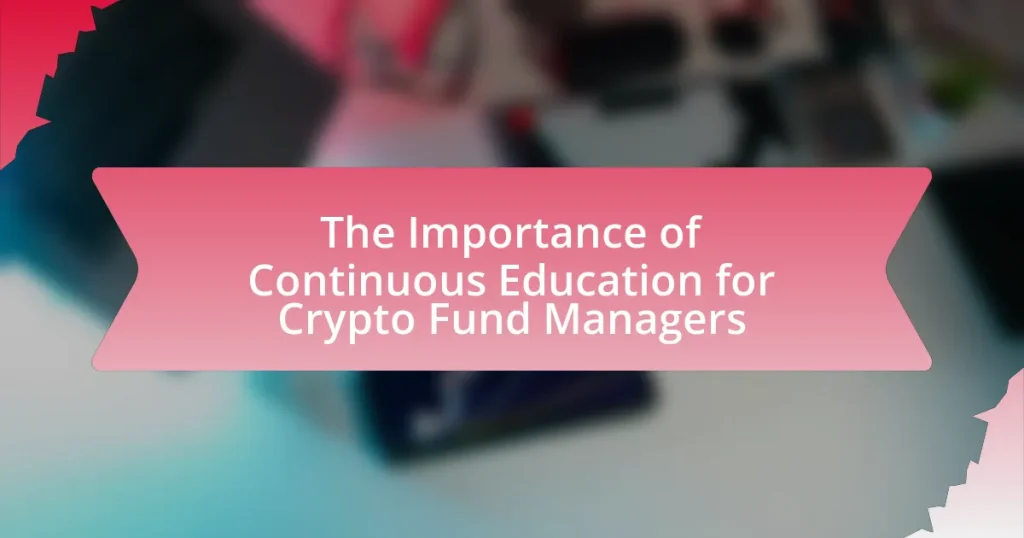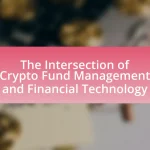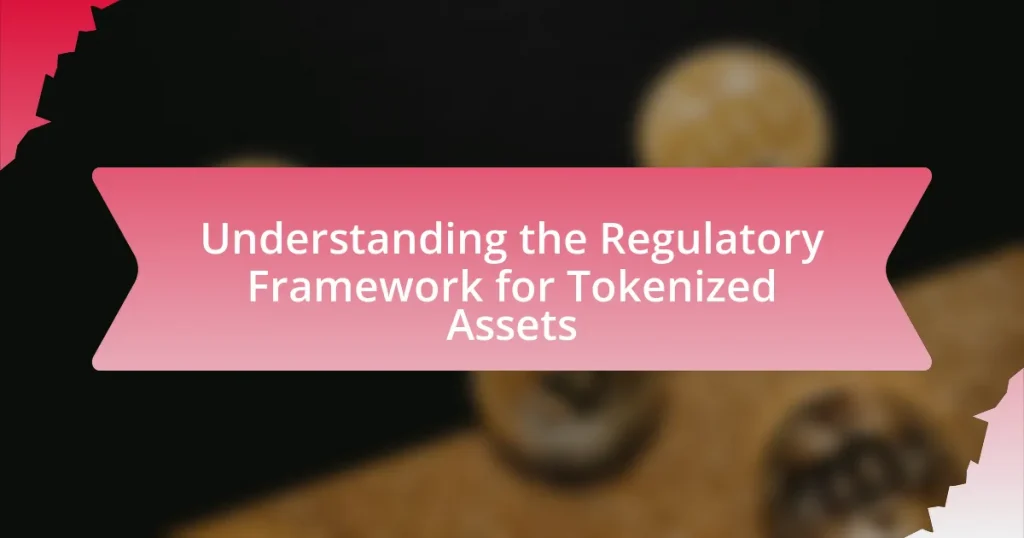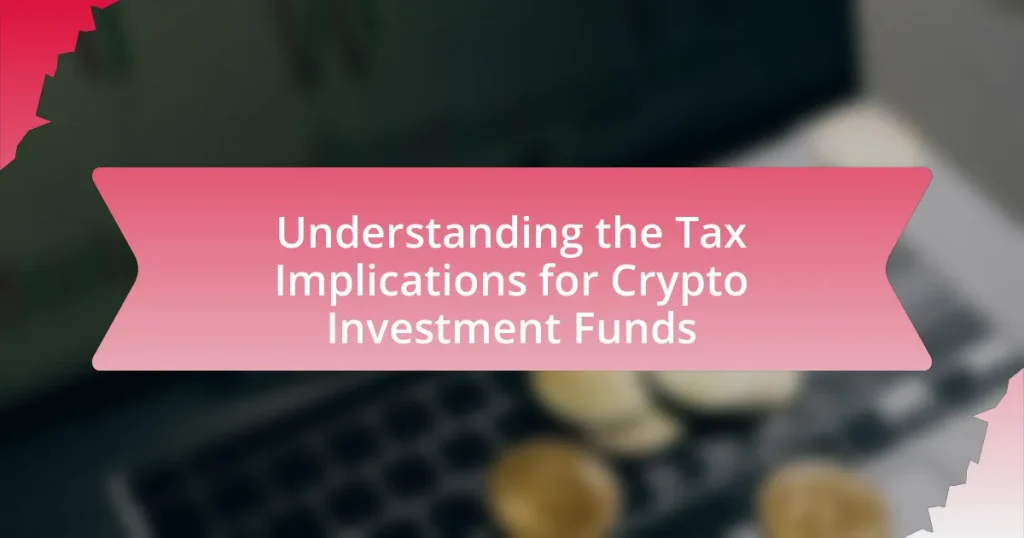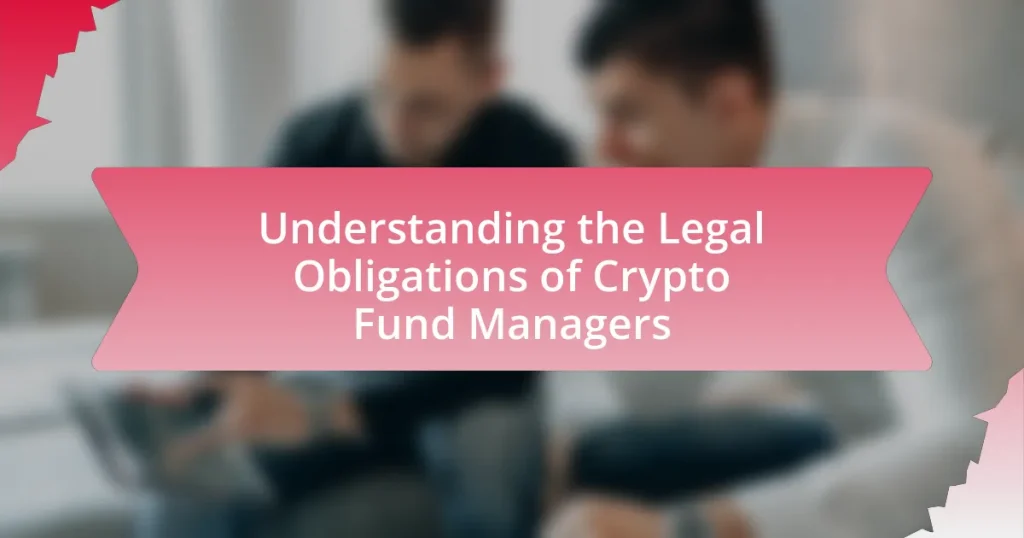Continuous education is essential for crypto fund managers to navigate the rapidly changing cryptocurrency landscape, characterized by technological advancements, regulatory shifts, and market volatility. The article outlines the challenges faced by these managers, including price unpredictability and compliance issues, and emphasizes the importance of ongoing learning to enhance decision-making and risk assessment capabilities. It discusses various methods for pursuing continuous education, such as online courses, webinars, and industry conferences, while highlighting the benefits of staying informed on market trends and technological developments. Additionally, the article addresses best practices for implementing effective education strategies and the potential pitfalls of neglecting practical experience in favor of theoretical knowledge.

Why is Continuous Education Important for Crypto Fund Managers?
Continuous education is crucial for crypto fund managers because it enables them to stay updated with the rapidly evolving cryptocurrency landscape. The cryptocurrency market is characterized by constant technological advancements, regulatory changes, and market volatility, which can significantly impact investment strategies. For instance, a study by the CFA Institute highlights that ongoing education helps finance professionals adapt to new trends and enhance their decision-making skills. By engaging in continuous learning, crypto fund managers can better navigate risks, identify opportunities, and ultimately improve fund performance.
What challenges do Crypto Fund Managers face in a rapidly changing market?
Crypto fund managers face significant challenges in a rapidly changing market, primarily due to the volatility and unpredictability of cryptocurrency prices. This volatility can lead to substantial financial losses, making it difficult for managers to maintain stable returns for their investors. Additionally, regulatory uncertainty poses a challenge, as laws governing cryptocurrencies are still evolving, which can impact investment strategies and compliance requirements. Furthermore, the rapid pace of technological advancements in blockchain and cryptocurrency necessitates continuous education for fund managers to stay informed about new tools, platforms, and market trends. According to a report by PwC, 77% of asset managers believe that the lack of regulatory clarity is a major barrier to investing in cryptocurrencies, highlighting the importance of ongoing education to navigate these complexities effectively.
How do market volatility and regulatory changes impact fund management?
Market volatility and regulatory changes significantly impact fund management by influencing investment strategies and risk assessment. Fund managers must adapt to fluctuating market conditions, which can lead to rapid changes in asset values, requiring them to frequently reassess their portfolios. For instance, during periods of high volatility, such as the 2008 financial crisis, fund managers often shifted to more conservative investments to mitigate risk.
Regulatory changes, such as the implementation of the Dodd-Frank Act in the United States, impose new compliance requirements that can affect operational costs and investment strategies. These regulations can limit the types of assets that fund managers can invest in or require additional reporting, thereby influencing decision-making processes. For example, after the introduction of stricter regulations, many hedge funds adjusted their strategies to focus on more liquid assets to ensure compliance and reduce risk exposure.
Overall, both market volatility and regulatory changes necessitate continuous education for fund managers to stay informed about best practices and adapt their strategies effectively.
What role does technological advancement play in the crypto space?
Technological advancement plays a crucial role in the crypto space by enhancing security, scalability, and transaction efficiency. Innovations such as blockchain technology, smart contracts, and decentralized finance (DeFi) platforms have transformed how transactions are conducted and verified, leading to increased trust and transparency. For instance, the implementation of proof-of-stake consensus mechanisms has improved energy efficiency and transaction speeds compared to traditional proof-of-work systems. Additionally, advancements in cryptographic techniques have strengthened the security of digital assets, reducing the risk of hacks and fraud. These developments underscore the necessity for crypto fund managers to engage in continuous education to stay informed about emerging technologies and their implications for investment strategies.
How does continuous education enhance decision-making for Crypto Fund Managers?
Continuous education enhances decision-making for Crypto Fund Managers by equipping them with up-to-date knowledge and skills necessary to navigate the rapidly evolving cryptocurrency landscape. This ongoing learning process allows fund managers to stay informed about market trends, regulatory changes, and technological advancements, which are critical for making informed investment decisions. For instance, a study by the CFA Institute found that continuous professional development significantly improves investment performance by fostering better analytical skills and risk assessment capabilities. By integrating new information and strategies into their decision-making processes, Crypto Fund Managers can optimize their portfolio management and respond effectively to market volatility.
What skills are essential for effective decision-making in crypto fund management?
Effective decision-making in crypto fund management requires analytical skills, risk assessment capabilities, and a strong understanding of market trends. Analytical skills enable fund managers to interpret complex data and identify investment opportunities, while risk assessment capabilities help in evaluating potential losses and gains associated with various assets. A strong understanding of market trends is crucial, as it allows managers to make informed predictions about future price movements and market behavior. Continuous education in these areas is essential, as the rapidly evolving nature of the cryptocurrency market demands up-to-date knowledge and adaptability to new information and technologies.
How can ongoing training improve risk assessment capabilities?
Ongoing training enhances risk assessment capabilities by equipping crypto fund managers with updated knowledge and skills to identify and evaluate emerging risks. Continuous education ensures that managers stay informed about the latest market trends, regulatory changes, and technological advancements, which are crucial for accurate risk evaluation. For instance, a study by the CFA Institute found that professionals who engage in ongoing education are better at recognizing potential threats and opportunities, leading to more informed decision-making. This proactive approach to learning fosters a culture of adaptability, enabling managers to respond effectively to the dynamic nature of the cryptocurrency market.
What are the benefits of continuous education for Crypto Fund Managers?
Continuous education for Crypto Fund Managers enhances their knowledge and skills, enabling them to make informed investment decisions in a rapidly evolving market. This ongoing learning process helps fund managers stay updated on regulatory changes, technological advancements, and market trends, which are crucial for effective portfolio management. For instance, a study by the CFA Institute highlights that continuous professional development significantly improves investment performance and risk management capabilities. Additionally, continuous education fosters networking opportunities with industry experts, facilitating knowledge exchange and collaboration, which can lead to better investment strategies and outcomes.
How does continuous education contribute to professional growth?
Continuous education significantly contributes to professional growth by enhancing knowledge, skills, and adaptability in a rapidly evolving field. For crypto fund managers, staying updated with the latest market trends, regulatory changes, and technological advancements is crucial for making informed investment decisions. Research indicates that professionals who engage in continuous learning are more likely to advance in their careers, as they acquire competencies that align with industry demands. A study by the World Economic Forum highlights that 94% of business leaders expect employees to pick up new skills on the job, underscoring the necessity of ongoing education for career advancement.
What impact does continuous education have on investor confidence?
Continuous education significantly enhances investor confidence by equipping fund managers with up-to-date knowledge and skills necessary for effective decision-making. When crypto fund managers engage in ongoing learning, they can better navigate market volatility, understand emerging trends, and implement innovative strategies. Research indicates that informed managers are more likely to achieve positive investment outcomes, which directly correlates with increased trust from investors. For instance, a study by the CFA Institute found that 70% of investors feel more confident when their fund managers demonstrate a commitment to continuous professional development. This relationship underscores the importance of education in fostering a secure and trustworthy investment environment.
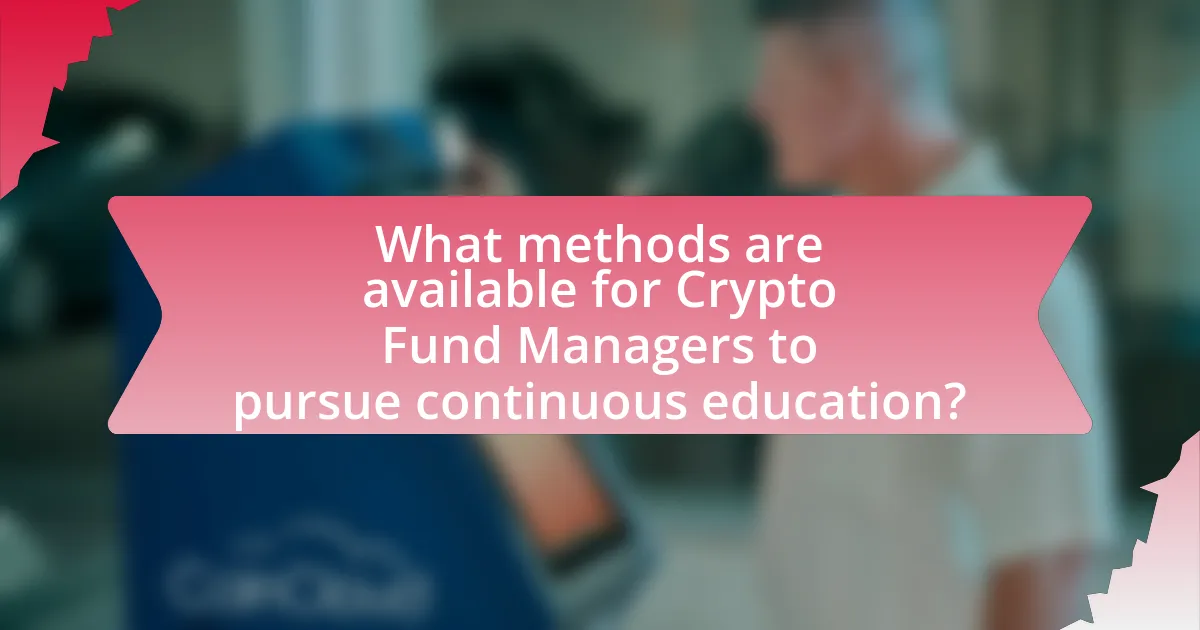
What methods are available for Crypto Fund Managers to pursue continuous education?
Crypto Fund Managers can pursue continuous education through various methods, including online courses, webinars, industry conferences, and professional certifications. Online platforms like Coursera and Udemy offer specialized courses in blockchain technology and investment strategies, enabling managers to stay updated with the latest trends. Webinars hosted by financial institutions and crypto organizations provide real-time insights and expert opinions on market developments. Attending industry conferences, such as Consensus and Blockchain Expo, allows managers to network with peers and learn from thought leaders. Additionally, obtaining professional certifications, such as the Chartered Financial Analyst (CFA) or Certified Cryptocurrency Trader (CCT), enhances their knowledge and credibility in the field. These methods collectively ensure that Crypto Fund Managers remain informed and competitive in a rapidly evolving market.
What types of educational resources are most effective for Crypto Fund Managers?
Online courses and webinars are the most effective educational resources for Crypto Fund Managers. These formats provide structured learning and access to expert insights, which are crucial in the rapidly evolving cryptocurrency landscape. For instance, platforms like Coursera and Udemy offer specialized courses on blockchain technology and investment strategies, enabling fund managers to stay updated on market trends and regulatory changes. Additionally, webinars hosted by industry leaders allow for real-time interaction and Q&A sessions, enhancing understanding and application of complex concepts. Research indicates that continuous education through these resources significantly improves decision-making and risk management skills among fund managers, ultimately leading to better investment outcomes.
How do online courses compare to traditional classroom learning?
Online courses offer greater flexibility and accessibility compared to traditional classroom learning. While traditional classrooms require physical attendance at scheduled times, online courses allow learners to access materials and complete assignments at their convenience, accommodating diverse schedules and locations. According to a study by the U.S. Department of Education, students in online learning conditions performed better, on average, than those receiving face-to-face instruction, highlighting the effectiveness of online education. Additionally, online courses often utilize a variety of multimedia resources, enhancing engagement and catering to different learning styles, which can be particularly beneficial for professionals like crypto fund managers who need to stay updated in a rapidly evolving field.
What role do industry conferences and seminars play in ongoing education?
Industry conferences and seminars play a crucial role in ongoing education by providing professionals with access to the latest trends, research, and networking opportunities within their field. These events facilitate knowledge sharing among experts, allowing attendees to learn about innovative strategies and regulatory changes that impact their industry. For instance, a study by the Association for Talent Development found that 75% of professionals believe that attending conferences enhances their skills and knowledge, directly contributing to their career advancement. Additionally, industry conferences often feature workshops and panel discussions led by thought leaders, which further enrich the educational experience and ensure that participants remain competitive in a rapidly evolving market.
How can Crypto Fund Managers stay updated with industry trends?
Crypto fund managers can stay updated with industry trends by actively engaging in continuous education through various channels. These channels include subscribing to reputable cryptocurrency news platforms, attending industry conferences, participating in webinars, and joining professional networks. For instance, platforms like CoinDesk and CoinTelegraph provide timely news and analysis, while events such as Consensus and Blockchain Expo offer insights from industry leaders. Additionally, joining organizations like the CFA Institute can provide access to resources and networking opportunities that enhance knowledge and awareness of market developments.
What are the best practices for following crypto market news and developments?
To effectively follow crypto market news and developments, individuals should utilize a combination of reputable news sources, social media platforms, and analytical tools. Reputable news sources such as CoinDesk and CoinTelegraph provide timely updates and in-depth analysis, while social media platforms like Twitter and Reddit offer real-time discussions and insights from industry experts. Additionally, analytical tools such as Glassnode and CryptoQuant can provide data-driven insights into market trends and on-chain metrics. These practices ensure that crypto fund managers remain informed about market dynamics, regulatory changes, and technological advancements, which are crucial for making informed investment decisions.
How can networking with peers enhance knowledge and insights?
Networking with peers enhances knowledge and insights by facilitating the exchange of diverse perspectives and experiences. Engaging with fellow professionals allows individuals to share best practices, discuss challenges, and explore innovative solutions relevant to their field. For instance, a study published in the Journal of Business Research found that peer networking significantly contributes to knowledge sharing and collaborative learning, which are crucial for adapting to the rapidly evolving landscape of cryptocurrency and finance. This collaborative environment fosters a deeper understanding of market trends and investment strategies, ultimately leading to more informed decision-making for crypto fund managers.
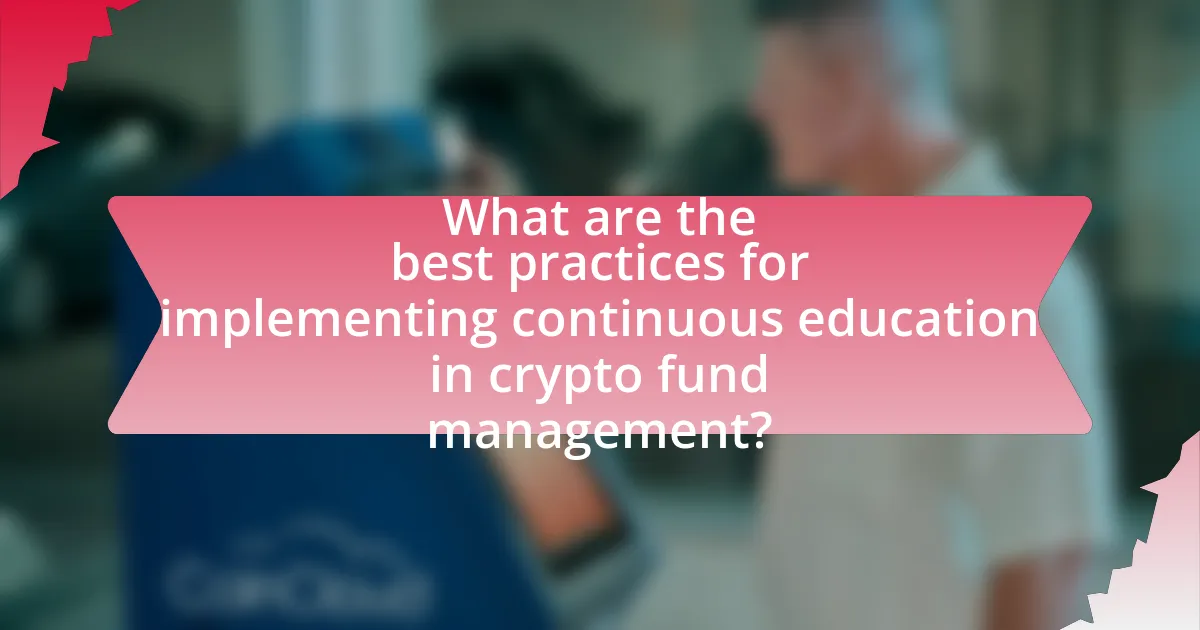
What are the best practices for implementing continuous education in crypto fund management?
The best practices for implementing continuous education in crypto fund management include establishing a structured curriculum, leveraging industry partnerships, and utilizing technology for ongoing training. A structured curriculum ensures that fund managers cover essential topics such as blockchain technology, regulatory changes, and market analysis, which are critical for informed decision-making. Collaborating with industry partners, such as educational institutions and crypto organizations, provides access to expert insights and resources, enhancing the learning experience. Additionally, utilizing technology, such as online courses and webinars, allows for flexible learning opportunities that can be tailored to individual needs, ensuring that fund managers stay updated with the rapidly evolving crypto landscape. These practices are supported by the increasing demand for skilled professionals in the crypto sector, as evidenced by a report from the World Economic Forum, which highlights the necessity for continuous skill development in emerging technologies.
How can Crypto Fund Managers create a personalized education plan?
Crypto Fund Managers can create a personalized education plan by assessing individual knowledge gaps and aligning learning objectives with specific investment strategies. This involves conducting a skills assessment to identify areas such as blockchain technology, market analysis, and regulatory compliance that require further development. By utilizing resources like online courses, webinars, and industry conferences tailored to these identified needs, managers can enhance their expertise effectively. Research indicates that continuous education improves decision-making and investment performance, as evidenced by a study from the CFA Institute, which found that ongoing professional development leads to better risk management and portfolio outcomes.
What factors should be considered when selecting educational programs?
When selecting educational programs, factors such as relevance to current industry trends, accreditation, curriculum quality, faculty expertise, and flexibility should be considered. Relevance ensures that the program addresses the latest developments in the crypto sector, which is crucial for fund managers to stay competitive. Accreditation signifies that the program meets established standards, enhancing its credibility. Curriculum quality reflects the depth and breadth of the content, which should include practical applications and case studies pertinent to crypto management. Faculty expertise is vital, as instructors with real-world experience can provide valuable insights. Lastly, flexibility in scheduling and delivery format (online or in-person) accommodates the busy schedules of crypto fund managers, allowing them to balance education with professional responsibilities.
How can managers measure the effectiveness of their continuous education efforts?
Managers can measure the effectiveness of their continuous education efforts by evaluating employee performance metrics before and after training initiatives. This can include analyzing changes in productivity, quality of work, and employee engagement scores. For instance, a study by the Association for Talent Development found that organizations with comprehensive training programs experience 218% higher income per employee than those without formalized training. Additionally, managers can utilize feedback surveys to assess knowledge retention and application of skills learned, providing concrete data on the impact of educational programs.
What common pitfalls should Crypto Fund Managers avoid in their education journey?
Crypto fund managers should avoid the pitfalls of relying solely on outdated information and neglecting regulatory changes in their education journey. Staying informed about the rapidly evolving cryptocurrency landscape is crucial, as the market is influenced by technological advancements and regulatory developments. For instance, the Financial Action Task Force (FATF) has implemented guidelines that affect how crypto assets are managed, and failure to adapt to these changes can lead to compliance issues. Additionally, crypto fund managers should not overlook the importance of diversifying their knowledge sources; relying on a single perspective can result in a narrow understanding of market dynamics. Engaging with a variety of educational resources, including academic research, industry reports, and expert opinions, enhances decision-making capabilities and risk management strategies.
How can over-reliance on one source of information be detrimental?
Over-reliance on one source of information can be detrimental because it limits perspective and critical analysis. When individuals or organizations depend solely on a single source, they risk missing out on diverse viewpoints and alternative data that could inform better decision-making. For instance, a study by the Pew Research Center found that exposure to a variety of news sources enhances understanding and reduces misinformation. This lack of variety can lead to biased conclusions and poor investment strategies, particularly in the volatile crypto market, where information is rapidly evolving. Therefore, continuous education and engagement with multiple sources are essential for informed decision-making in the context of crypto fund management.
What are the risks of neglecting practical experience in favor of theoretical knowledge?
Neglecting practical experience in favor of theoretical knowledge poses significant risks, including a lack of real-world application and diminished problem-solving skills. Practical experience allows individuals to apply theoretical concepts in dynamic environments, which is crucial in fields like crypto fund management where market conditions can change rapidly. Without hands-on experience, fund managers may struggle to make informed decisions, leading to potential financial losses. Studies indicate that professionals who engage in experiential learning outperform their peers who rely solely on theoretical knowledge, highlighting the importance of integrating both forms of learning for effective performance in complex fields.
What practical tips can Crypto Fund Managers apply for effective continuous education?
Crypto Fund Managers can enhance their continuous education by engaging in regular participation in industry conferences and webinars. These events provide insights into the latest trends, regulatory changes, and technological advancements in the cryptocurrency space. For instance, attending conferences like Consensus or the Crypto Finance Conference allows managers to network with experts and gain firsthand knowledge from thought leaders. Additionally, subscribing to reputable cryptocurrency research publications and following influential analysts on social media platforms can keep managers informed about market dynamics and investment strategies. Implementing a structured learning plan that includes online courses focused on blockchain technology and financial analysis can further solidify their expertise. This approach is supported by the fact that continuous learning is essential in a rapidly evolving field like cryptocurrency, where staying updated can significantly impact investment decisions and fund performance.
